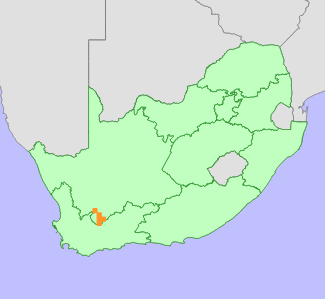|
Scientific Name | Lachenalia longituba (A.M.van der Merwe) J.C.Manning & Goldblatt |
Higher Classification | Monocotyledons |
Family | HYACINTHACEAE |
Synonyms | Polyxena longituba A.M.van der Merwe |
National Status |
Status and Criteria | Vulnerable D2 |
Assessment Date | 2016/11/14 |
Assessor(s) | G.D. Duncan & D. Raimondo |
Justification | Lachenalia longituba is a range-restricted and localized habitat specialist with an extent of occurrence (EOO) of 350 km² and area of occupancy(AOO) of less than 20 km². It is known from five locations and is potentially threatened by habitat loss and degradation. It is therefore listed as Vulnerable under criteria D2. |
Distribution |
Endemism | South African endemic |
Provincial distribution | Northern Cape |
Range | This species is endemic to South Africa, and is found in the Roggeveld Escarpment south-east of Sutherland. |
Habitat and Ecology |
Major system | Terrestrial |
Major habitats | Roggeveld Karoo, Central Mountain Shale Renosterveld, Roggeveld Shale Renosterveld, Nieuwoudtville-Roggeveld Dolerite Renosterveld |
Description | It grows in stony clay in seasonally wet, boggy sites that bake rock hard in summer. |
Threats |
| Overstocking of rangelands is causing widespread degradation of native vegetation across the Roggeveld Escarpment. While this species is not browsed, its wetland habitat is sensitive to trampling. Another potential threat is habitat loss to the construction of renewable energy infrastructure (G.D. Duncan pers. comm. 2016). |
Population |
Lachenalia longituba is a localized, but locally abundant species occurring in large colonies. Recent field observations in the Klein Roggeveld indicate that it is possibly more widespread than the small area of the Roggeveld Escarpment south-east of Sutherland where it was first discovered (N.A. Helme pers. obs. 2016).
|
Population trend | Stable |
Assessment History |
Taxon assessed |
Status and Criteria |
Citation/Red List version | | Lachenalia longituba (A.M.van der Merwe) J.C.Manning & Goldblatt | VU D2 | 2017.1 | | Lachenalia longituba (A.M.van der Merwe) J.C.Manning & Goldblatt | Least Concern | Raimondo et al. (2009) | |
Bibliography |
Duncan, G.D. 2012. The genus Lachenalia. Kew Publishing, Royal Botanic Gardens, Kew.
Manning, J.C., Goldblatt, P. and Fay, M.F. 2004. A revised generic synopsis of Hyacinthaceae in sub-Saharan Africa, based on molecular evidence, including new combinations and the new tribe Pseudoprospereae. Edinburgh Journal of Botany 60(3):533-568.
Raimondo, D., von Staden, L., Foden, W., Victor, J.E., Helme, N.A., Turner, R.C., Kamundi, D.A. and Manyama, P.A. 2009. Red List of South African Plants. Strelitzia 25. South African National Biodiversity Institute, Pretoria.
Snijman, D.A. 2013. Plants of the Greater Cape Floristic Region 2: The extra Cape flora. Strelitzia 30. South African National Biodiversity Institute, Pretoria.
Van der Merwe, A.M. and Marais, E.M. 2001. A new species of Polyxena (Hyacinthaceae, tribe Massonieae) from Komsberg, Northern Cape Province. South African Journal of Botany 67(1):44-46.
|
Citation |
| Duncan, G.D. & Raimondo, D. 2016. Lachenalia longituba (A.M.van der Merwe) J.C.Manning & Goldblatt. National Assessment: Red List of South African Plants version . Accessed on 2025/06/30 |
 Comment on this assessment
Comment on this assessment


